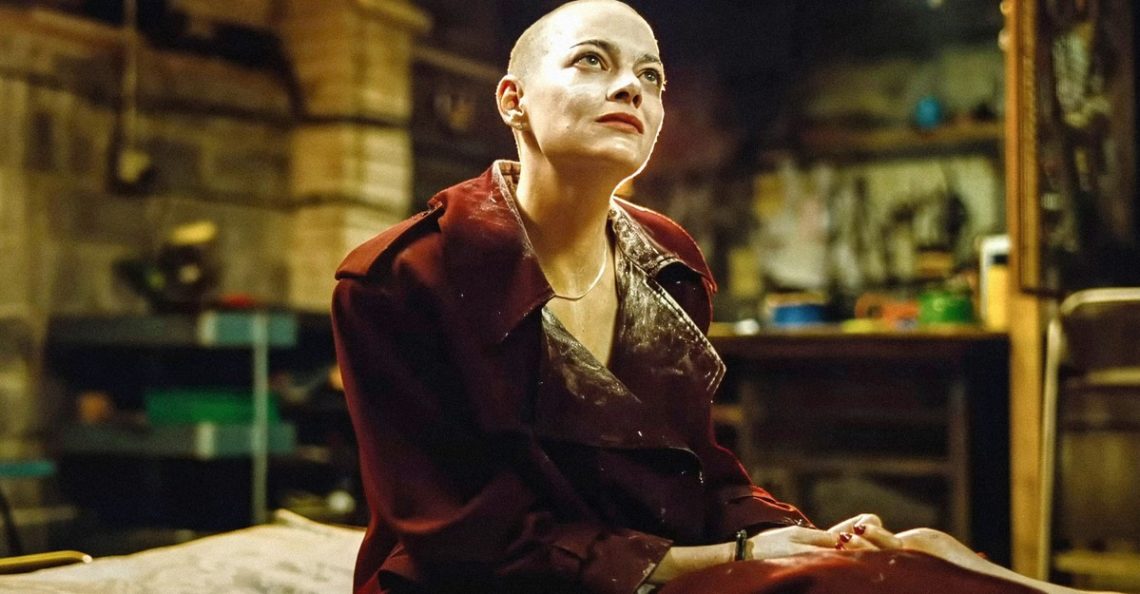Bugonia, the latest film from the Greek director Yorgos Lanthimos, begins with shots of bees. As they gently buzz about in a field of wildflowers, a voice-over intones the glory of the insects’ lives. Their ability to help another species reproduce through pollination is, the speaker marvels, like “sex, but cleaner.” Their beauty emerges from their “larger organizing principle.”
The voice belongs to Teddy (played by Jesse Plemons), a recluse who spends his days alternating between beekeeping and obsessively researching “Andromedans,” a humanoid race of extraterrestrials that he and other deep-web truthers believe has infiltrated Earth’s population. Teddy is convinced that their kind is planning to destroy the planet, and that Michelle Fuller (Emma Stone), the CEO of a major pharmaceutical company, is an alien central to their scheme. But Bugonia’s provocative premise doesn’t yield a sci-fi thriller. The film instead offers an intimate, unhurried exploration of human cruelty.
A remake of the 2003 South Korean black comedy Save the Green Planet, Bugonia retains the broad strokes of the earlier film’s plot. But Lanthimos applies his own, distinctive touch. Save the Green Planet indulges in knotty twists and a maximalist visual flair; Bugonia, meanwhile, is muted, often resembling a chamber drama. There are few characters, minimal flourishes of surreality, and a complete lack of the outré whimsy that defined several of Lanthimos’s previous projects with Stone, including Poor Things and The Favourite. The filmmaker instead evokes his earlier work—namely Dogtooth and The Killing of a Sacred Deer—combining the mannered, hermetic bleakness of those tales with the befuddled existentialism of a Samuel Beckett play.
The resulting story amounts to a paranoia-fueled war of attrition. Teddy, after successfully kidnapping Michelle and imprisoning her in his basement, spends much of the film attempting to make her admit that she’s an Andromedan; Michelle, believing that her high profile will expedite her rescue, refuses to give in. Assisting Teddy is his autistic cousin, Don (Aidan Delbis), whose childlike innocence and loyalty to Teddy make the negotiations feel even more uncomfortable: The more enraged Teddy becomes at Michelle’s denials, the more Don questions whether he should support his cousin—a conundrum he’s forced to parse alone. But Bugonia’s restrained approach conveys Teddy’s dread about the world around him. The bees are dying, the corporations have too much power, and every other online fringe community has ignored him; for someone like Teddy, believing that aliens are to blame is almost a comfort. At one point, he explains to Don that the only way they can get Michelle to confess is to practice “maximum focus.” The film follows his lead, constructing a near-relentless study of misery that culminates in a disturbing finale.
That such a grim movie enthralls more than it repels is largely because Plemons and Stone, who proved to be excellent scene partners in Lanthimos’s Kinds of Kindness, ground their characters in an unexpected poignancy. Teddy, who seems perpetually covered in grease and dirt, is hard to root for as a protagonist; he’s self-righteous, quick to anger, and at times mistreats Don, his only ally. Yet Plemons imbues him with despair, finding a pitiful fragility in his aggression. Michelle comes across as an outright villain at first, talking almost exclusively in chilly, insincere corporate speak and treating her employees with passive-aggressive disregard. Stone portrays Michelle’s ruthlessness as something of a mask, however—a well-practiced method to quash her fears and insecurities. Both characters, Bugonia suggests, delusionally believe themselves to be heroes. They’re so self-important and solipsistic that they’re oblivious to how heartless they’ve become.
Maybe that’s why Teddy and Michelle’s conversations tend to resemble a feedback loop, in which neither character is willing to compromise: Teddy accuses Michelle of being an Andromedan, Michelle counters by insisting that Teddy needs help, and Teddy follows up by lashing out at her. Although plenty of these exchanges are biting—and broken up by an amusing subplot involving a local cop poking around Teddy’s property—they can make the film an endurance test for viewers. Lanthimos indulges in long takes, while the composer Jerskin Fendrix’s thudding, metronomic score contributes to the film’s oppressive atmosphere. The characters’ discussions touch on topical subjects, such as the wealth gap, the internet as a breeding ground for conspiracism, and the psychological effects of climate change. But rarely do they lead to anything other than further animosity between the adversaries. I certainly itched for a fast-forward button when Teddy threatened Michelle for the umpteenth time.
But Bugonia won me over when that resentment finally exploded into cathartic violence. Given how much of the story takes place in a confined setting, when one character launches themselves across a table to attack another, the moment is breathtaking. Throughout the movie, Lanthimos doles out pieces of backstory in short, dreamlike sequences that unfurl in black and white, artfully filling in the blanks of Teddy’s particular interest in Michelle. These scenes add an emotional heft to the barbed-tongue dialogue, giving meaning to all the pent-up anger.
Bugonia, the word, never gets uttered in the film. The term calls to mind the begonia, a type of flower—but it actually refers to an ancient Greek belief that a cow’s carcass could spawn bees, that life could come from death. Teddy refuses to entertain that notion; he keeps Michelle alive, believing that he can be the one to negotiate the terms to keep Earth intact. Humans like him, he insists, deserve to survive. Yet all his “maximum focus” seems to have merely led to myopia. Teddy blames an extraterrestrial race that may not exist for turning people into mindless drones, instead of wondering whether the planet he’s trying to protect is beyond saving. For all its strangeness, Bugonia seems concerned, in the end, with a pair of pretty simple truths: Humankind hasn’t taken care of Earth. No one else is about to, either.
The post The Alien Invaders Just Want to Chat appeared first on The Atlantic.




